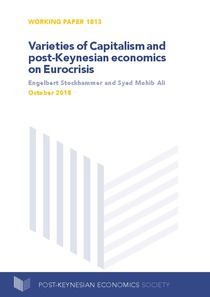Varieties of Capitalism and post-Keynesian economics on eurocrisis
"The 2008 global financial crisis that began in the US housing sector mutated into a sovereign debt crisis and an economic depression for countries in southern Europe, threatening the very existence of the Eurozone. The paper contrasts analyses of the eurocrisis based on the Varieties of Capita...
| Main Authors: | , |
|---|---|
| Institution: | ETUI-European Trade Union Institute |
| Format: | TEXT |
| Language: | English |
| Published: |
Leeds
2018
PKES |
| Subjects: | |
| Online Access: | https://www.labourline.org/KENTIKA-19304965124911221479-Varieties-of-Capitalism-and-po.htm |
| _version_ | 1771659899380432896 |
|---|---|
| author | Stockhammer, Engelbert Ali, Syed Mohib |
| author_facet | Stockhammer, Engelbert Ali, Syed Mohib |
| collection | Library items |
| description | "The 2008 global financial crisis that began in the US housing sector mutated into a sovereign debt crisis and an economic depression for countries in southern Europe, threatening the very existence of the Eurozone. The paper contrasts analyses of the eurocrisis based on the Varieties of Capitalism (VoC) approach and post-Keynesian analysis. The VoC analysis has argued that the eurocrisis is ultimately a crisis of incompatible institutional settings, in particular wage bargaining institutions, tied together in a monetary union. The Mediterranean Market Economies lack the institutional capacities to restrain wage growth. The Coordinated Market Economies (in northern Europe) have managed to maintain modest wage growth and inflation because export-oriented sectors play the role of wage leader. Post-Keynesian analysis has interpreted the crisis as the outcome of the unsustainable growth models and neoliberal policies in Europe; i.e. a neo-mercantilist export-led demand regime in the North and a debt-driven demand regime in the South and the EMU policies of financial deregulation that accompanied European economic integration. What is specific to the Euro area is the absence of adequate central fiscal stabilization or effective lender of last resort facility for the member countries. The ECB was hesitant in its unconventional monetary policy and began buying government bonds of countries under pressure only at a late stage of the crises. The imbalances resulted in a full blown sovereign debt crisis. We argue that the VoC analysis has important shortcomings as it focuses excessively on labour market institutions and that the post-Keynesian approach integrates financial factors and economic policy in explaining the crisis." |
| format | TEXT |
| geographic | EU countries |
| id | 19304965124911221479_370930eadb0d4e69aa47e9e39269057a |
| institution | ETUI-European Trade Union Institute |
| is_hierarchy_id | 19304965124911221479_370930eadb0d4e69aa47e9e39269057a |
| is_hierarchy_title | Varieties of Capitalism and post-Keynesian economics on eurocrisis |
| language | English |
| physical | 16 p. Digital |
| publishDate | 2018 |
| publisher | Leeds PKES |
| spellingShingle | Stockhammer, Engelbert Ali, Syed Mohib economic model EMU ECB economic recession economic policy Varieties of Capitalism and post-Keynesian economics on eurocrisis |
| thumbnail | https://www.labourline.org/Image_prev.jpg?Archive=136253595443 |
| title | Varieties of Capitalism and post-Keynesian economics on eurocrisis |
| topic | economic model EMU ECB economic recession economic policy |
| url | https://www.labourline.org/KENTIKA-19304965124911221479-Varieties-of-Capitalism-and-po.htm |

